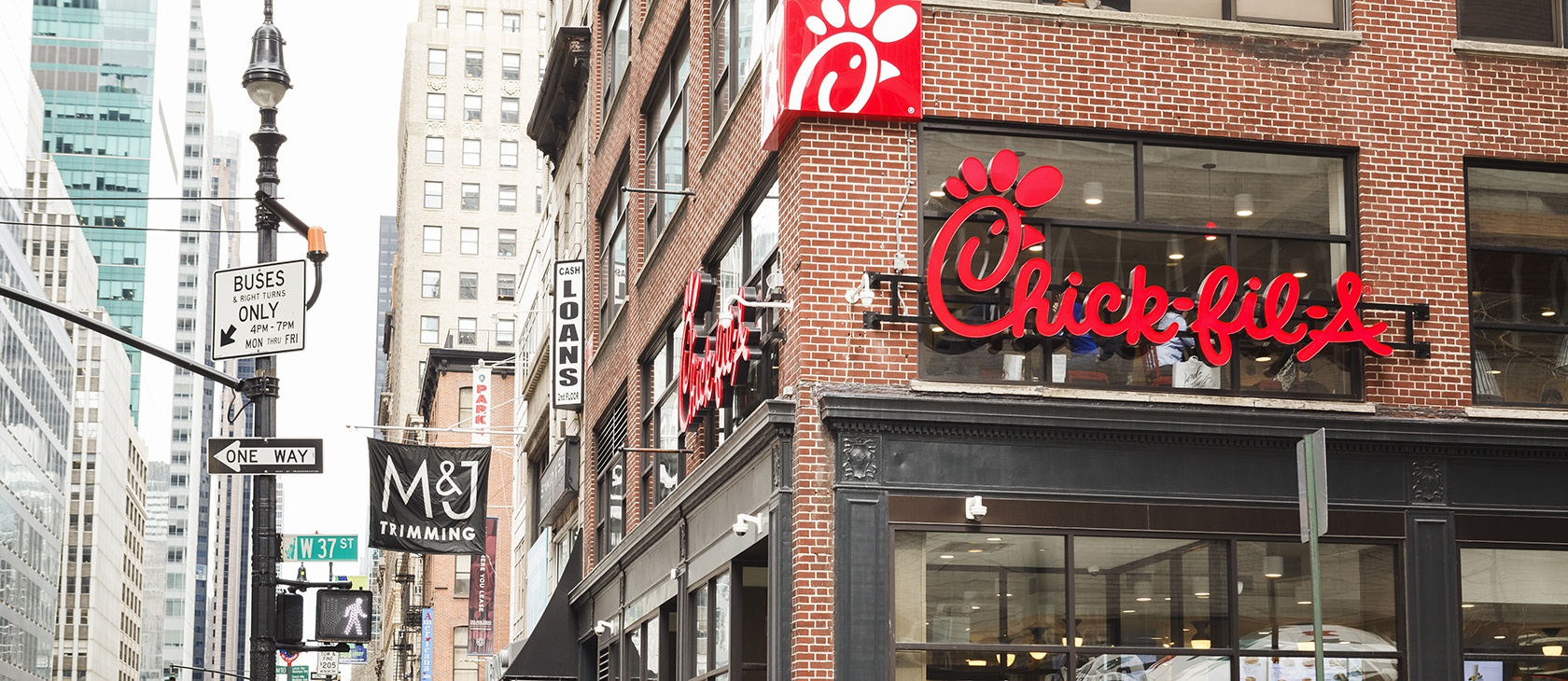America’s fastest-growing food chain has taken its customer-pleasing brand of savory deliciousness and rapid, polite service to New York City where it is proving that northern city dwellers enjoy the same thing that has captivated southerners for decades. Chick-fil-A Inc. is meeting the primary test of acceptance, which is the market test. Lines are long. Business is booming. If the Atlanta-based company with $9 billion in sales last year were traded publicly (it remains privately held), the city’s Wall Street community would be bidding the stock up to stratospheric levels.
But the company’s success sticks in the craw of some who find it to be an alien presence due to the Christianity of the family who owns the company and their traditional values. A recent New Yorker piece refers to the Chick-fil-A expansion as a “creepy infiltration” of the city. The writer expresses part of his alarm by noting that the company’s headquarters includes a “statue of Jesus washing a disciple’s feet.” (I have to admit that I’m surprised by the writer’s apparent disgust at this portrayal of humility, love, and service.)
...they suggested that it is not enough to run a business in a way that respects all customers and provides excellent quality and service...
When Chick-fil-A CEO Dan T. Cathy originally launched an unwitting controversy by honestly answering a question put to him regarding the nature of marriage (male and female, according to him), the company was swamped by customers rushing to show support. The more interesting aspect of the kerfuffle was the comments made by mayors of Chicago and Boston suggesting that Chick-fil-A, with 2,200 restaurants in 47 states, likely had no place in their towns. Some found the remarks chilling because they suggested that it is not enough to run a business in a way that respects all customers and provides excellent quality and service, but rather that the owners of businesses must believe and repeat the reigning sexual orthodoxy (one, at that time, not yet even endorsed by five of nine justices on the Supreme Court).
The mayors in question, then, endorsed an ideological test for commerce. Such a test would eventually prove the undoing of political freedom and dissent generally. Both Milton Friedman and Frederick Hayek pointed out that if human beings can be prevented from making a living unless they hold particular political views, then dissent can easily be stamped out. Many regimes, they observed, have accomplished that task in like fashion.
The New Yorker piece is a little different, though. Its author, Dan Piepenbring, seems to object almost on grounds similar to those who seek to keep strip clubs away from kindergartens and churches. In other words, Chick-fil-A is some kind of offensive presence in New York because it is alien to the moral aesthetics of the place. On this view, America’s largest city is not a good place for Christians or traditionalists to do business. It doesn’t matter if they are extremely good at what they do. It is enough that they don’t fully embrace an appropriate level of cultural “wokeness.”
To be fair to the author, he’s not crazy about McDonald’s and Starbucks, either. He throws shade at both companies for their “deadening uniformity”. Consumers are also a problem, because of their preference for established goods over things that are “new and untested.” He seems to be saying that if Chick-fil-A has the gall to bring another chain to New York, it should at least have the good taste to adopt the progressive politics he can count on with Starbucks.
It occurs to me that Piepenbring may be missing the clear reality that he seems to prefer a “deadening uniformity” of his own. People who want to do business in his town need to have his sensibilities and his values. New York, once famous as the “melting pot of culture,” supposedly thrives on diversity, but even the slightest reflection of Chick-fil-A’s “pervasive Christian traditionalism” is a problem for what is apparently some kind of New York monoculture.
One wonders how Piepenbring would feel if his analysis were to be transplanted to other parts of the country. What if a southern, Christian writer were to crusade against a successful, New York-based retail business on the idea that the ideas of their secularist, anti-traditional owners simply didn’t belong in Tennessee or Georgia? Indeed, I have a feeling that if that traditionalist writer were to try to stir up disdain against a progressive “Yankee” business along similar lines, Piepenbring might accuse such a person of being a bigot of some kind … Imagine that.




